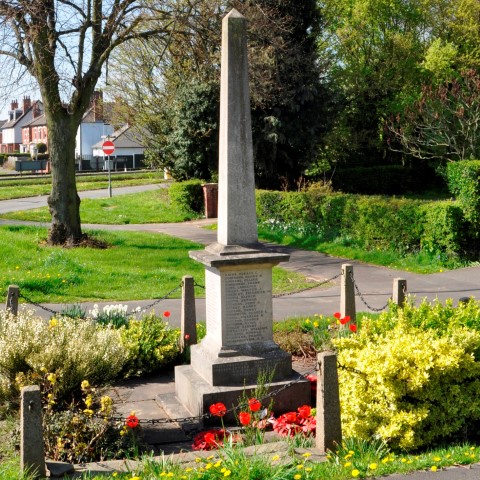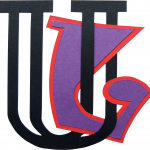A Woman of Substance – Tony Enthwhistle
In 21st century Britain, the definition of ‘family’ confounds description and is capable of infinite variety!
But, as Tony Entwhistle recalls, in 1950s Borrowash, it meant Mum, Dad and 2.5 children. His family did not fit that description and he is keen to pay tribute to a ‘terrific’ mother faced with difficulties not of her making, and a social climate still in the grip of ‘Victorian values’.
We interviewed Tony, now retired and living in Spondon, as part of our Unexamined Livesproject and his account of 1950s family life shows that just 60 years ago, people lived, worked and judged their friends and neighbours in line with the codes of a very different world.
Tony’s mother, Jessie Webster was born in 1917. Home was 2, Washington Cottages in Borrowash, and her father was employed as an engine inspector at Rolls Royce.
When money was tight, he decamped to Newcastle, finding work in the shipyard and sending money home to support his wife and children.
Tony remembers his grandfather reminiscing about ‘servicing the cars of the Indian Maharajas’ and ‘being prepared to go where the work was’.
A family of six children soon outgrew their tiny cottage, and in 1933, the Websters rented a house in Princess Drive.
The Frost family next door enjoyed the luxury of electricity, but the Webster’s’ landlord, Mr Cheetham’ Didn’t want to mess with number 17’, so Jessie had to do her homework in gaslight.
Not that it put her off.
Her report for the 1931 Easter Term at Spondon House School ( Motto: Ingredere Ut Proficias – Enter in order to Profit) shows her obtaining virtually full marks in every subject from Mathematics to Drawing and earning praise as The top girl in the school from Head Master , GH Williams.
And then she met the man who ‘blighted her life’, according to Tony – the man who would become his own father – Albert Entwhistle.
Mr Entwhistle was born in Clayton Le Moors, a village outside Accrington. When he met Jessie Webster, he worked as a fitter in the cooling towers at the Power Station in Spondon.
They married on the 20th April, 1940, in the Borrowash Methodist Church, and started married life on Albert’s home turf of Clayton where Tony was born.
Albert Entwhistle had none of the principle and devotion to family that had so characterised Jessie’s own father.
In Tony’s words ‘he ran off with a number of women and she left him’.
Jessie moved with Tony to a house in Blackburn before reconciling with Albert who vowed that he had changed his ways.
He hadn’t.
Jessie had no choice but to return to live with her parents in Borrowash with Tony – and new baby, Peter.
She divorced Albert for adultery in 1953.
Jessie had been the innocent party, but returning to her parents with two small children and no husband was decidedly uncomfortable. Divorce carried a stigma and Borrowash was a village. Jessie had excelled at school, but now she had distinguished herself for all the wrong reasons.
The children did not see their father; maintenance payments of £1 per month could not feed them and she refused to live off her parents.
But top marks for Maths at school were not wasted – she was pleased and relieved to secure a job in the Motor Taxation Department at Derbyshire County Council.
Meanwhile, Tony and Peter bedded down in Borrowash – and Tony started school at Dean’s Drive with the redoubtable Miss Johns as Headmistress.
He remains tight lipped about what he actually learnt there, but praises its proximity to Williamsons’ bakery.
‘they used to sell little loaves and they were a penny; little Hovis loaves and they were absolutely excellent they were, I’ll never forget them.’
He earned pocket money for collecting his grandfathers’ tobacco from the Co-op, eggs ‘from Mrs Cotton in Borrowash’ and ‘odd bits’ from Radford’s the green grocers and spent the proceeds!
‘I bought a dinky! The first one was a ‘Triumph Renown’ at 2 shillings and 11 pence and I loved it!’
The Websters did not have a television, so it was great to go to Joe Orme’s house at number 11 to watch Muffin the Mule and Formula One motor racing with Stirling Moss at the McKendal home in Station Road.
But this was a treat.
From day to day, Tony relied upon home-made fun – building dens from disused police dog kennels in the local police house garden; Cowboys and Indians at the Manor Road allotments and amateur dramatics in Ian McKendal’s shed at ‘the big house’, 5 Station Road.
Being friends with lan Burrows, son of the local chip shop owner had advantages:
We used to go there and get a free bag of chips,’
and disadvantages:
‘He had a cockatoo in a cage at the back and it were a right nasty thing – it ‘ud ‘ave yer blummin leg off.’
Winters were very ‘winterish, not like today,’ and snow spawned sledges constructed from car tires, pram wheels and trollies ‘with bent over nails to keep the axle in place’.
But it wasn’t always good, clean fun as Tony discovered when he came to grief at Borrowash weir:
The weir had dried up and we used to slide down it on our feet , but at the bottom where it was flat, there was a layer of green slime and one of the times I went down I hit this green slime. I just accelerated at about sixty miles an hour and ended up in the river!
Although it wasn’t very deep, I absolutely stunk like a pole cat.’
He stripped off and dried his clothes in the sun ‘but the smell was absolutely horrendous.’
And he tells a Borrowash tale of smoking behind the bike shed!
‘Grandad had packets of little cigars like and cigarettes in this old brick shed at the end of the garden and I pinched some of these one day and we went down to Dave Stanilands’ greenhouse and smoked all these fags. By gad, I’d never been so ill in all my life, couldn’t believe it but… no, he never found out!’
Family life at Princess Drive brought its own treats, such as a trip to Derby on a Barton bus with Jessie and his grandmother:
‘A bit more luxurious than the Trent bus because Trent buses had the wooden slat seats at that time’
and a visit to Ratcliffe’s toy shop followed by ‘an ice-cream in a silver bowl at Jimmy’s’.
Tony accompanied his grandfather to Elvaston Castle and the Golden Gates where they saw ‘the local hunt and all the brightly coloured costumes’, attended the Baptist Church on Palm Sunday in tribute to Uncle Harry who had been killed in World War Two and watched Aunty Edna’s star turn as Principal Boy in the Christmas pantomime, courtesy of Parish Clerk supremo, Frank Smith.
Jessie made blancmanges and cakes for the school Christmas party: ‘a beano with games’ and Grandma swept the board at the whist and beetle drives.
Summer meant Bridlington with the family on parade, marshalled by Grandad:
He used to have these boots – he used to whiten ‘em; he had a white flat cap — you could walk along the promenade with one hand in your pocket, but you could never walk along with two. If you walked with two, you got a belt around the ear hole with a rolled up newspaper – so it didn’t take yer long to learn how to walk properly.’
And Tony recalls motorcycle grass track racing at Hopwell Hall, a Queen’s coronation party in the Manor Road cul de sac and a school trip to Derby’s Regal cinema, to watch Hillary and Tensing conquering Everest.
But nothing was quite like Christmas with a ten foot tree: ‘we had to chop a couple of feet off it to get it in the house’ and an uncle from Scunthorpe who played Santa, in ‘a red mac with cotton wool round it – and they put all the presents that everybody had got in an army kit bag and after we’d had our dinner, he dished them all out and that was a really nice time.’
There was a reason for the good food!
‘My uncle Dennis served his apprenticeship with Coates the butchers – I can always remember , we had roast beef on Sundays and terrific meals – never short of good food and things you probably shouldn’t eat today – but they lived till about 90 anyway!’
One Christmas, they were joined by a guest, Harry Hunt, soon to become Jessie’s second husband and stepfather to Tony and Peter.
By now, Jessie was divorced and free to re-marry so Harry was made welcome:
‘He seemed to go down ok,’ remembered Tony.
Jessie had started a new job as a barmaid at The Bell Hotel in Derby and Harry was an Assistant Divisional Officer at the Jury Street Fire Station. He often popped in for a pint with his mates.
Tony and Peter were to have a stepfather.
Life had been fine at Princess Drive, but Jessie was tremendously proud to conform to the ideal family at last – Mum, Dad, two children…….
She wore a smart coat-dress with a flower corsage for her wedding and home became a Fire Station house in Jury Street. Life was perfect when Harry became Officer in Charge of the new Fire Station in Chaddesden.
Tony recalls a ‘very generous man,’ who treated the extended family, plus grandparents, to holidays in Bridlington, Webster favourite and new delights like Great Yarmouth and Eastbourne.
For the fatherless children, it was quite wonderful:
‘We had never experienced anything like this before.’
But just as Grandad Webster insisted on standards for walking down the promenade, Harry was a stickler for manners, cleanliness and dress code.
‘He inspected the front and back of your hands and neck after visits to the bathroom’.
He also seemed to have a lucky streak – and won about £5,000 on the football pools in the early fifties. This was enough to buy a smart new house in Chellaston on his retirement from the Fire Service in 1956.
Tony and Peter had to leave Spondon House School and start again at Shelton Lock, which meant that Tony had to find new friends and start from scratch in what was to be his last year at school.
Meanwhile, he had a little sister – Angela – born in March 1957.
But Harry’s health was a concern.
He had retired because of emphysema, probably caused by being gassed whilst fire-fighting during the war.
But Jessie could not have imagined that a year after setting up house and nine months after giving birth to her third child – she would begin 1958 as a widow.
According to Tony:
‘Mum was distraught. She had experienced just a few years of real happiness and now she had to start all over again: a woman on her own with children – and now she had an extra one.’
Jessie’s top priority was the children – keeping a roof over their heads and food on the table. She had no-one to help her – no extra income and there was nothing for it but to find work quickly.
She got a job as a barmaid at the Bridge Inn at Shelton Lock.
It was a nice pub and she was as professional as ever – but the brief glimpse of security and a different way of life had vanished with the death of Harry.
‘Mum had a hard life. She said that whatever she earned, 50% went down the drain in tax. She walked everywhere and if she was going to town or coming back, she’d walk past a couple of bus stops just so she could save a few pence’.
Tony became an apprentice turner at Rolls Royce followed by bus driving in Melbourne, working as a postman and milkman and his final job was as a Heavy Goods driver before retirement.
His brother Peter and sister Angela, both favoured artistic careers, Peter as a cartoonist inCheshire and Angela as Head of the Art Department at the University of the Highlands andIslands.
Jessie lived on her own, downsizing from the Chellaston semi to a one bed roomed house near to the Red Lion pub.
Her last years were ravaged by Alzheimer’s disease and she died of the illness at The Laurels Nursing Homes in Spondon – visited faithfully by Tony and his wife and cared for by dedicated staff.
It was a sad end to a life that had seemed to hold such a bright future for the girl who came top of Form 3G at Spondon House in 1931.
As Tony said:
Mum was clever and beautiful – she could have done anything.
But the times weren’t fair to her.
She was the most terrific mum in the world and I wish I could have done as much for her as she did for me.
The ‘good old days’ could – and should – have been a bit kinder to Jessie Webster.







One Response to A Woman of Substance – Tony Enthwhistle